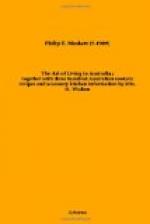It is not my purpose to enter fully into all the details concerning the teeth, but there are one or two matters of great importance connected with them which require a few words. There are many people, beginning to get on in years, perhaps, who have had the misfortune to lose many of their teeth. The first thing that happens is an inability to masticate their food; and, before long, indigestion sets in, with all the evils attendant on its train. These unfortunates know that they have indigestion; the pain and discomfort after food tell them that. They do not know, however, that all their sufferings arise solely from their want of teeth. They begin to lose flesh, and get altogether in a bad way. But if they can be induced to apply to a competent and skilful dental surgeon, they are properly fitted with what they require, and the consequence is their sufferings almost immediately cease. They begin to enjoy their food, and before long their whole appearance is transformed into one of health. In the opinion of all dental authorities, when the natural teeth are lost, artificial substitutes unquestionably conduce to health and comfort.
It is quite deplorable to see what little interest people take in the preservation of their teeth; even those who should know better are in too many instances quite as neglectful. But the teeth play a very important part in the thorough division of food, and if this be not ensured the health is bound to suffer. They should be kept scrupulously clean, therefore, and the formation of tartar prevented.
These two objects are best accomplished by their thorough cleansing with a moderately stiff brush. Too soft a brush is insufficient for the purposes of removing the accumulations which collect upon the teeth. A tooth-powder or dentifrice of some kind will also be required. One of the simplest, and possibly also one of the very best, is composed of the following:
Powdered borax 1/2 an ounce.
Powdered orris root 1 ounce.
Powdered white Castile soap 1/4 of an ounce.
Precipitated chalk 3 ounces.
Oil of cloves 2 drops.
Oil of winter green 1/2 an ounce.
This leaves nothing to be desired, and will be found satisfactory in every respect.
It is customary to dip the tooth-brush into water, so as the better to enable it to take up the dentifrice. But it will be found an advantage if, after dipping the brush into water, it then be rubbed once or twice over a piece of white Castile soap. It will by this means pick up a larger amount of the powder. The teeth should be attended to after each meal, although cleansing them the last thing at night is an important duty, never on any account to be neglected. It must not be imagined, however, that even the foregoing is sufficient. Particles of food, which the brush fails to remove, collect between the teeth, and, if allowed to remain, ultimately lead on to decay. This is most likely to occur when the teeth are crowded close together in the jaw. But under all circumstances, whether the teeth be closely set together, or whether they be more widely apart, a piece of floss silk should be passed between them daily, so as to remove any adherent particles, and at the same time to thoroughly cleanse the sides of the teeth.




